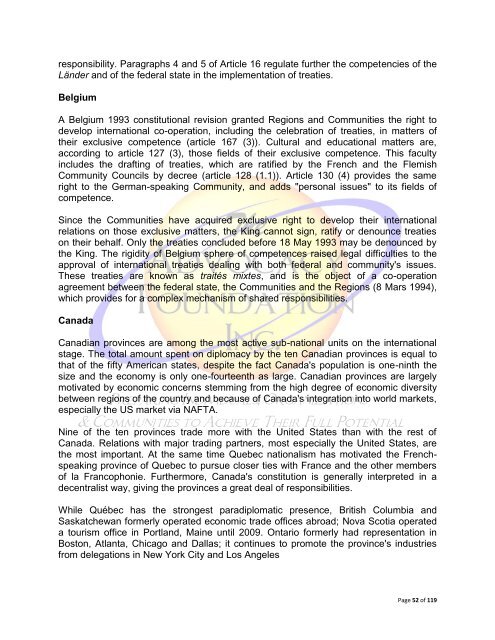International Legal Evangelism: Intelligence, Reconnaissance & Missions
International Legal Evangelism: Intelligence, Reconnaissance & Missions
International Legal Evangelism: Intelligence, Reconnaissance & Missions
Create successful ePaper yourself
Turn your PDF publications into a flip-book with our unique Google optimized e-Paper software.
esponsibility. Paragraphs 4 and 5 of Article 16 regulate further the competencies of the<br />
Länder and of the federal state in the implementation of treaties.<br />
Belgium<br />
A Belgium 1993 constitutional revision granted Regions and Communities the right to<br />
develop international co-operation, including the celebration of treaties, in matters of<br />
their exclusive competence (article 167 (3)). Cultural and educational matters are,<br />
according to article 127 (3), those fields of their exclusive competence. This faculty<br />
includes the drafting of treaties, which are ratified by the French and the Flemish<br />
Community Councils by decree (article 128 (1.1)). Article 130 (4) provides the same<br />
right to the German-speaking Community, and adds "personal issues" to its fields of<br />
competence.<br />
Since the Communities have acquired exclusive right to develop their international<br />
relations on those exclusive matters, the King cannot sign, ratify or denounce treaties<br />
on their behalf. Only the treaties concluded before 18 May 1993 may be denounced by<br />
the King. The rigidity of Belgium sphere of competences raised legal difficulties to the<br />
approval of international treaties dealing with both federal and community's issues.<br />
These treaties are known as traités mixtes, and is the object of a co-operation<br />
agreement between the federal state, the Communities and the Regions (8 Mars 1994),<br />
which provides for a complex mechanism of shared responsibilities.<br />
Canada<br />
Canadian provinces are among the most active sub-national units on the international<br />
stage. The total amount spent on diplomacy by the ten Canadian provinces is equal to<br />
that of the fifty American states, despite the fact Canada's population is one-ninth the<br />
size and the economy is only one-fourteenth as large. Canadian provinces are largely<br />
motivated by economic concerns stemming from the high degree of economic diversity<br />
between regions of the country and because of Canada's integration into world markets,<br />
especially the US market via NAFTA.<br />
Nine of the ten provinces trade more with the United States than with the rest of<br />
Canada. Relations with major trading partners, most especially the United States, are<br />
the most important. At the same time Quebec nationalism has motivated the Frenchspeaking<br />
province of Quebec to pursue closer ties with France and the other members<br />
of la Francophonie. Furthermore, Canada's constitution is generally interpreted in a<br />
decentralist way, giving the provinces a great deal of responsibilities.<br />
While Québec has the strongest paradiplomatic presence, British Columbia and<br />
Saskatchewan formerly operated economic trade offices abroad; Nova Scotia operated<br />
a tourism office in Portland, Maine until 2009. Ontario formerly had representation in<br />
Boston, Atlanta, Chicago and Dallas; it continues to promote the province's industries<br />
from delegations in New York City and Los Angeles<br />
Page 52 of 119

















